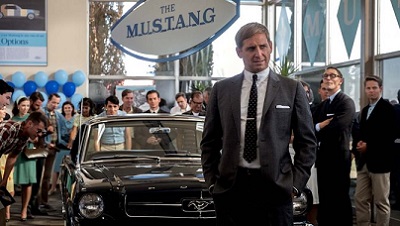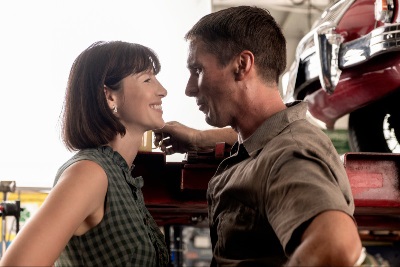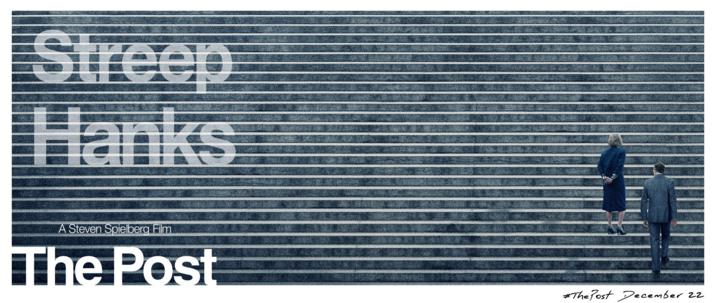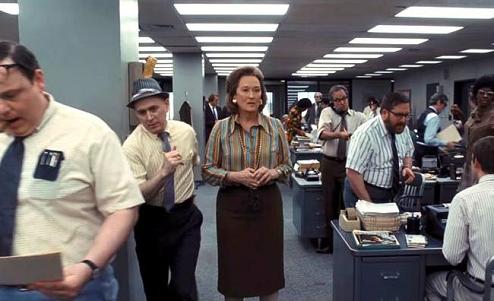It was avid car aficionado in the form of Lynn‘s West Virginia uncle who turned me on to the biopic film about the 1966 automobile race 24 Hours of Le Mans. This particular film, and the facts underpinning it, tells the story about the stranglehold that the Ferrari brand had on the race at the time as well as the battle Ford had in becoming relevant there for a four year stretch beginning in 1966. The film that addresses this contest is Ford v Ferrari (2019).
 (From left, Matt Damon as Carroll Shelby and Tracy Letts as Henry Ford II in the film Ford v Ferrari).
(From left, Matt Damon as Carroll Shelby and Tracy Letts as Henry Ford II in the film Ford v Ferrari).
The crux of the film starts around the time that the Ford Mustang as a vehicle was introduced, with Ford owner Henry Ford II (as played by Tracy Letts) making an overture to Ferrari owner Enzo Ferrari (as played by Remo Girone) to acquire the motor company owned by Ferrari, and being soundly rebuffed in a move to increase the sales price to Fiat. This led to a courting by Ford of Carroll Shelby (as played by Matt Damon) and Ken Miles (as played by Christian Bale).
 (From left, Stefania Spampinato as Enzo Ferrari‘s English Translator and Remo Girone as Enzo Ferrari in the film Ford v Ferrari).
(From left, Stefania Spampinato as Enzo Ferrari‘s English Translator and Remo Girone as Enzo Ferrari in the film Ford v Ferrari).
The means of being rebuffed by Enzo Ferrari opened, or perhaps revealed, an emotional rivalry between he and Henry Ford II that revealed some interesting dynamics in the way Ford was operated as a company. Lee Iacocca, as portrayed by Jon Bernthal, brought Carroll Shelby into the Ford company when Henry Ford II demanded engineers and money into the company to have the wherewithal to compete with Ferrari at Le Mans.
 (From left, Jon Bernthal as Lee Iacocca and Corrado Invernizzi as Franco Gozzi in the film Ford v Ferrari).
(From left, Jon Bernthal as Lee Iacocca and Corrado Invernizzi as Franco Gozzi in the film Ford v Ferrari).
The compelling notion of what worked in the movie Ford V Ferrari was first the racing story with the fortunes of two automobile companies at the center of it. Also there were the personalities within Ford, with Shelby and Miles as clearly outsiders to the corporate culture of the larger company. Iacocca was a bit of a middleman between that culture and the work getting done by Shelby and Miles.
 (Josh Lucas as Leo Beebe in the film Ford v Ferrari).
(Josh Lucas as Leo Beebe in the film Ford v Ferrari).
Josh Lucas as Leo Beebe was the face of that corporate culture, and in many ways vilified for his role in how the 24 Hours of Le Mans came to a resolution in 1966. There was natural tension in his trusted role in Ford and the natural conflict that arose in holding the Shelby / Miles team to an account that also reflected on the public face of what Ford wished to project. Said another way, a story of Ford v Ferrari was the means for how mean with well-defined senses of self worth worked together. This came into play as well between Shelby and Miles, the both of them and Beebe, and the full lot of them and Henry Ford II with Iacocca in the middle. Ken Miles and his wife, Mollie Miles as portrayed by Caitriona Balfe, had their own form of intrigue as shown in Ford v Ferrari.
 (From left, Caitriona Balfe as Mollie Miles and Christian Bale as Ken Miles in the film Ford v Ferrari).
(From left, Caitriona Balfe as Mollie Miles and Christian Bale as Ken Miles in the film Ford v Ferrari).
I found the movie Ford v Ferrari both entertaining and interesting. There’s history in the telling, despite some clear fictionalized dramatization included for the sake of the telling. The fiction offered something that worked for me in this case, though there are some muscle car folks that might not agree. I rate Ford v Ferrari at 3.75-stars on a scale of one-to-five.
Matt – Wednesday, July 15, 2020


 (Meryl Streep)
(Meryl Streep) (Tom Hanks)
(Tom Hanks) (Bob Odenkirk)
(Bob Odenkirk) (Steven Spielberg)
(Steven Spielberg)